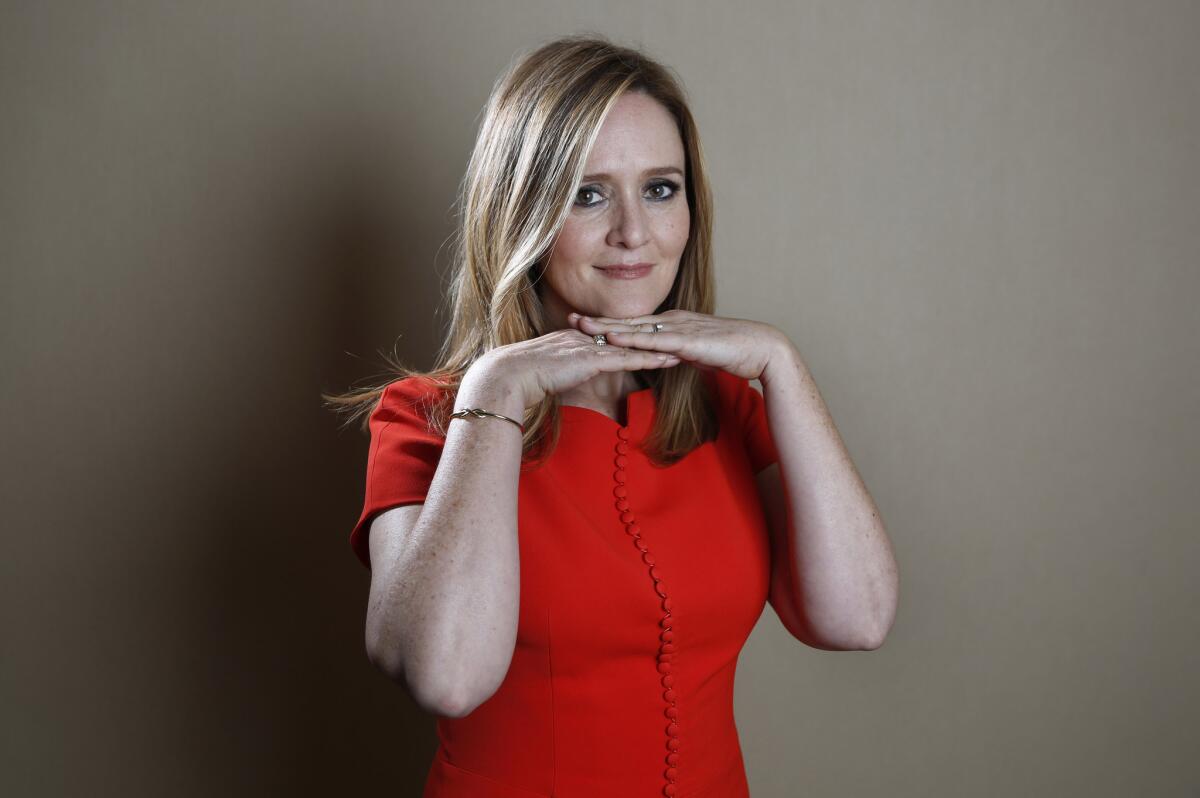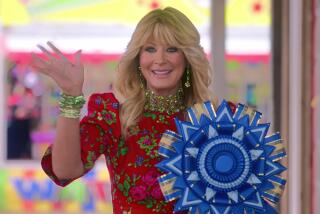Samantha Bee has the solution for Hollywood’s diversity problem: ‘Just hire people’

Samantha Bee at the Langham Hotel in Pasadena. Bee’s new TBS talk show, “Full Frontal,” will premiere on Feb. 8, 2016.
Samantha Bee brings her satirical late-night show “Full Frontal” to TBS starting Monday night. The comedian, who spoke to The Times for this week’s Sunday Conversation, spent 12 years at “The Daily Show” and was for a time its only female correspondent.
Naturally, she had plenty to say about diversity, which continues to be an issue for late-night television: Not only are the hosts overwhelmingly white and male, but so are the writers behind the scenes.
See more of Entertainment’s top stories on Facebook >>
In a rarity for the genre, “Full Frontal” has not only a female host but also a writing staff evenly divided between men and women, 25% of whom are people of color. Below are additional excerpts from the conversation in which Bee explained the hiring process for her show, discussed her plans to launch a mentorship program and presented a novel solution for Hollywood’s diversity problem.
You and executive producer Jo Miller used a blind submission process to hire your writers. Can you explain that decision and how the process worked?
Neither of us come from a comedy-writing background. She wanted to, I think, be very encouraging to people like herself who weren’t from a college age determined to write for a late-night comedy show. The efforts paid off. I think we have a really interesting, diverse crowd here. We thought a lot about it.
Every year at the Emmys, it’s so depressing when they do the thing where they read the names of the late-night writers because each show has like one woman. Every time they’re asked about it, the hosts make it sound like it’s a systemic problem — that they’re just not getting diverse applicants.
It is, but you have to break down the system. It takes a lot of work, so I see why it doesn’t get done. You have to reach through people’s comfort levels. You have to reach out to people who wouldn’t naturally think that they could do it, or they didn’t really come from that background.
Jo created a submission packet. All the shows send [applicants] a set of instructions for what they want in the first writing packet. Hers was so different from any other packet I’d ever seen before. It just leveled the playing field. It just gave people all of the information that they would need to turn in a really polished, really professional-looking packet.
It’s such a basic thing, but the format in which you receive scripts is so specific in this world. If you don’t nail the format, your packet is at a total disadvantage because it’s apparent that you don’t work in comedy and nobody wants to read it. It’s like turning in your thesis handwritten.
Jo sought to level that playing field by giving people the structure that they needed, by showing them exactly how it needed to look so that their jokes could be taken on their own merits. Now, I can’t tell you never worked in comedy before, I can’t tell you’re inexperienced. That was huge. It makes a big difference.
We’re trying to create a mentorship program. We’re not quite attacking it yet because we actually need to get a show on the air. But once we do that, we’re going to structure a mentorship program so that we can bring people in from all walks of life.
There’s a lot of conversations about the Oscars, and studios have a lot of sitdowns with think tanks, and they consider how they’re going to get people of color into things and what they’re going to do. Sometimes you just have to go, “You’re hired.” How about if you hire someone? How about if you just, say, greenlight something? You can do that too. You have the power to do that. Just hire somebody. Just start there and just hire people. You don’t always have to go the same places to find your interns, OK?
It seems like part of it is also laziness — always recruiting from the same places.
It’s just missing that extra step of the hiring part. You have to make that effort. You have to actually call people and go, “Hey, who do you know?” Then talk to that person, and go, “Do you know anyone?” You have to reach out phone call by phone call and bring people in and talk to them. Do it that way. It’s very time-consuming. I feel like the studios have the time to do it. I could be wrong.
Does being in a more diverse room feel different?
It doesn’t feel different to me at all. It feels natural. It feels normal. It’s not like we walk into a room and high five each other every minute.
Follow @MeredithBlake on Twitter.
More to Read
The complete guide to home viewing
Get Screen Gab for everything about the TV shows and streaming movies everyone’s talking about.
You may occasionally receive promotional content from the Los Angeles Times.






